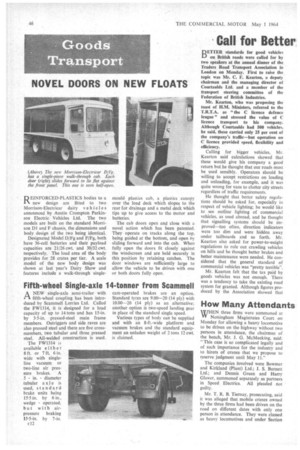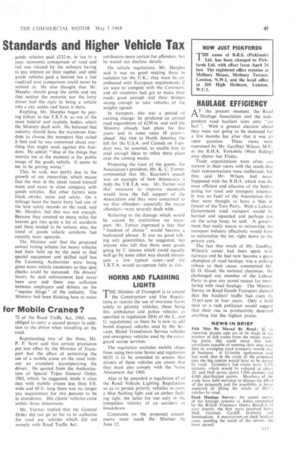Call for Better Standards and Higher Vehicle Tax
Page 48

Page 49

If you've noticed an error in this article please click here to report it so we can fix it.
BETTER standards for good vehicles on British roads were called for by two speakers at the annual dinner of the Traders Road Transport Association in London on Monday. First to raise the topic was Mr. C. F. Kearton, a deputy chairman and the managing director of Courtaulds Ltd. and a member of the transport steering committee of the Federation of British Industries.
Mr. Kearton, who was proposing the toast of H.M. Ministers, referred to the T.R.T.A. as "the C licence defence league" and stressed the value of C licence transport to his company. Although Courtaulds had 500 vehicles, he said, these carried only 25 per cent of the company's traffic—but operation on C licence provided speed, flexibility and efficiency.
Calling for bigger vehicles, Mr. Kearton said calculations showed that these would give his company a good return but he thought that our roads must be used sensibly. Operators should be willing to accept restrictions on loading and unloading, for example, and it was quite wrong for vans to clutter city streets regardless of traffic requirements.
He thought that better safety regulations should be asked for, especially in respect of vehicle lighting; he would like to see outline lighting of commercial vehicles, as used abroad, and he thought that signalling systems should be improved—too often, direction indicators were too dim and were hidden away under tailboards and so forth. Mr. Kearton also asked for power-to-weight regulations to rule out crawling vehicles on hills and he thought better brakes and better maintenance were needed. He considered that the general standard of commercial vehicles was "pretty terrible".
Mr. Kearton felt that the tax paid by goods vehicles was not enough. There was a tendency to take the existing road system for granted. Although figures produced by the Association showed that
goods vehicles paid £232 m. in tax in a year, economic comparison •of road and rail was vitiated by the railways having to pay interest on their capital, and until goods vehicles paid a heavier tax a fair road/rail cost comparison could never be arrived at. He also thought that Mr. Marples should grasp the nettle and say that neither the motorist nor the lorry driver had the right to bring a vehicle into a city centre and leave it there.
Replying, Mr. Marples began by paying tribute to the T.R.T.A. as one of the most helpful and realistic bodies which the Ministry dealt with. He believed that industry should have the maximum freedom to choose the transport that suited it best and he was concerned about anything that might work against this freedom. He added: "One of the things that worries me at the moment is the public image of the goods vehicle, It seems to me to be getting worse,"
This, he said, was partly due to the growth of car ownership, which meant that the man in the street found himself more and more in close company with goods vehicles. But other factors were black smoke, noise and safety. On a mileage basis the heavy lorry had one of the best safety records on the road, said Mr. Marples, but this was not enough. Because they covered so many miles the heavies got into quite a lot of accidents and these tended to be serious; also, the trend of goods vehicle accidents had recently been upwards.
The Minister said that the proposed annual testing scheme for heavy vehicles had been held up by the need to find special equipment and skilled staff but the Licensing Authorities were being given more vehicle examiners so that spot checks could be increased. On drivers' hours, he said enforcement had never been easy and there was collusion between employers and drivers on the "maniac fringe" of the industry. The Ministry had been thinking how to make retribution more certain fqr 'offenders, but he would not disclose details.
On vehicle regulations, rMr. Marples said it was no good making these in isolation for the U.K.; they must be coordinated with European requirements if we were to compete with the Continent.• and all countries had got to make their roads good enough and their bridges strong enough to take vehicles of the weights agreed.
In transport, this was a period of exciting change; he predicted an annual road expenditure of £250 rn. and said the Ministry already had plans for five years—and in some cases 10 years— ahead. His visit to North America (he left for the U.S.A. and Canada on Tuesday) was, he asserted, to enable him to steal enough ideas to refine these plans over the coming weeks. • .
Proposing the toast of the guests, the Association's president, Mr. K. C. Turner, commented that Mr. Kearton's speech was an example of how democratic a body the T.R.T.A. was. Mr. Turner said that measures to improve standards would have the full support of the Association and they were concerned to see that offenders—especially the major offenders—were severely dealt with.
Referring to the damage which would be caused by restrictions on transport, Mr. Turner expressed a fear that "freedom of choice" would become a hackneyed phrase. It was no good talking airy generalities, he suggested, but anyone who felt that there were goods going by C licence which could equally well go by some other way should investigate a few typical cases—and the T.R.T.A. would co-operate fully in this.




















































































































































































































































